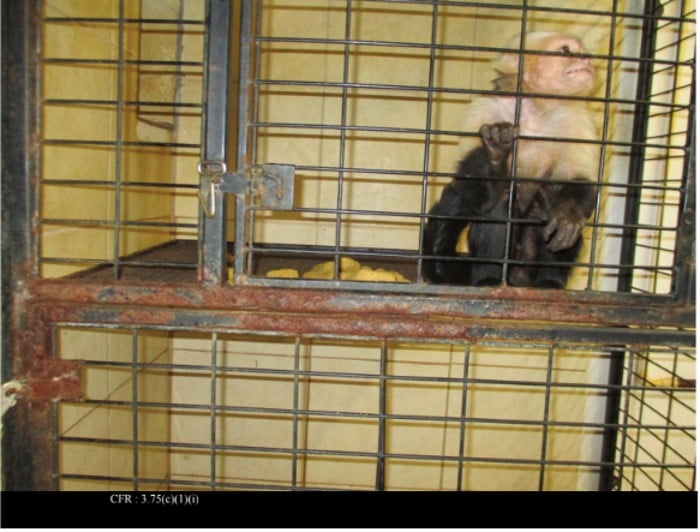Attractions involving animals often are billed as “fun” or “harmless” must-see experiences – but the reality is that exhibited animals often suffer horrifically behind the scenes.
A Lady Freethinker investigation into dozens of active, USDA-licensed exhibitors who feature animals revealed suffering, abuse, and death — spanning petting zoos, roadside zoos, drive-thru safaris and traveling exhibits, and for exotic animal “performers” and animals rented out for films, commercials, promotions and special events.
LFT found that venues consistently stuck to the same mendacious marketing about working closely with inspectors, prioritizing animal welfare, and having strong bonds with the animals.
However, documents obtained from local, state, and federal public records requests revealed welfare routinely took a back seat to profits. Venues claiming to have clean slates actually had long histories of welfare violations, and facilities claiming to treat animals humanely or “like family” actually often left animals in filthy enclosures, denied them basic medical care, and failed to provide adequate food, water, or shelter, the records showed.
Don’t be fooled by the facades. To help animals everywhere, never attend events or patronize places that offer paid physical interactions with animals, force wild animals to travel routinely or to engage in unnatural behaviors, or cage and exploit exotic animals in the name of “conservation” or being a “sanctuary” for abused or rescued animals.
Here are five reasons why, along with some of the most egregious venues identified in the public records documents.
1.Physical Contact Is Not “Fun” for the Animals
Animal attractions often market paid, hands-on contact with animals as an “exciting,” “fun” or “harmless” experience – along with claims that interactions are on the animals’ own terms.
That wasn’t the case for a 9-week-old otter pup found dead the day after he reportedly was used in 12 to 15 public interactions, advertised as lasting 30 minutes each, at Blue Springs Safari (also known as the G and J Traveling Petting Zoo) in Guntown, Mississippi.
The venue’s registered owner, John Mark Johnson, and the veterinarian who examined the baby otter’s corpse both said they believed “the pup died as a result of stress from the previous day’s public encounters and handling,” according to the USDA inspection report.
Johnson’s venue, which rents out animals for photography sessions and also welcomes visitors to touch and interact with numerous other species, also has been cited by federal inspectors for:
- Allowing unsafe physical contact with lemurs
- Allowing a kangaroo to languish in a 97.6-degree metal trailer parked in direct sunlight
- Keeping rabbits in a 93-degree enclosure without cooling
Other animals have had their welfare endangered too, including a goat with an inadequately treated eye condition, a 1-week-old lamb with “ribs that were palpable,” eight ruminants who could not bear weight on some of their limbs, and animals without food and water, according to USDA reports.
Drive-thru “Safaris” also hold deadly dangers for animals.
The Lazy 5 Ranch in Mooresville, North Carolina, got cited by federal inspectors for allowing dangerous, unsupervised public contact with animals, among other violations — including four waterbuck found dead in the drive-thru area with a single shelter that hadn’t allowed them to acclimate to their new environment.
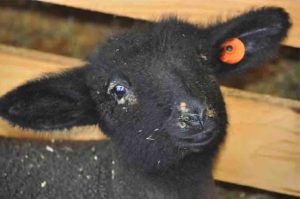
A lamb with excessive crust on her eyes and nose at Henry Hampton’s facility. (Courtesy of USDA)
Owner Henry Hampton, who also owns a second animal attraction called The Farm at Walnut Creek, also got cited repeatedly for inadequate medical care over the years, including the following, according to USDA reports:
- Limping aoudad and blackbuck
- A sika deer with multiple wounds
- A lamb with a closed left eye who was reluctant to move
- A goat stained with infectious drainage
- Several animals with untreated eye issues and masses
- A giraffe with overgrown hooves
- A Tahr goat kept in complete darkness in his stall
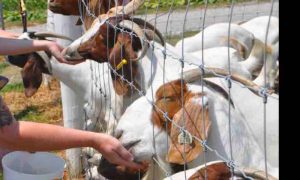
A goat put her head through the fence during an unattended interaction and required USDA help to extricate herself at Henry Hampton’s facility. (Photo Courtesy of USDA
A paying customer visiting Wilstem Wildlife Park in Paoli, Indiana, ran over an emu with his vehicle, leaving a severed leg in the path until staff arrived and shot the suffering animal to death, according to public records documents. The facility also has been cited for repeat, unsupervised public interactions with animals, an eland who escaped and broke her neck, an escaped kangaroo shot to death, and a sick, live llama whose skull was crushed with an excavator bucket after Wilstem staff dropped him into a pit, according to USDA documents.
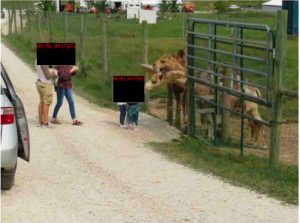
Animal interaction without a Wilstem employee present (Courtesy of USDA)
Federal documents also point to a donkey with a protruding, broken bone left to suffer overnight, and to public interactions with animals extending for an extra 2.5 hours each day after inspectors had expressed concerns about animals being exhibited too much.
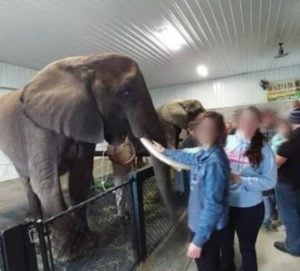
Wilstem Inc elephant interaction (Image via Yelp)
Sign Lady Freethinker’s petition urging officials to relocate sick and suffering animals at Wilstem Wildlife Park to reputable sanctuaries.
SIGN: Stop Exploiting Elephants for Entertainment at Indiana Wildlife Exhibit
2. Wild Animals Aren’t Meant to Perform or Travel.
Traveling shows often say they have built strong bonds with the animals and treat them humanely. The reality is that life on the road can be torturous — or even deadly — for wild animals, who can’t express natural behaviors like socializing, playing, or roaming while confined to tiny travel crates for hours on end. But the circumstances for “retired” performers, no longer in the public spotlight (or scrutiny) can also be ghastly, with some exhibitors relegating their former super stars to filthy and substandard enclosures.
USDA-licensed exhibitor Tim Lepard has bragged to media that he and his traveling monkey “rodeo” Team Ghost Riders – an “act” involving capuchin monkeys dressed in costumes, forced to ride dogs as they chase sheep at speeds of more than 30 mph — are on the road for more than 300 days a year.
Lepard has forced the animals to perform on days when temperatures exceeded 90 degrees and in front of screaming crowds of more than 115,000 people, according to news reports. One year, his entire “act” — monkeys, dogs, and sheep — died from carbon monoxide poisoning while on the road.
While Lepard’s traveling schedule doesn’t allow for much USDA oversight – with inspection reports showing Lepard wasn’t home for three of the last four attempted inspections – inspectors caught him in April and cited him for seven welfare violations, including giving his dogs expired ivermectin (a commonly used anti-parasitic in animals), not having the animals seen by a vet in more than two years, and incomplete medical records for animals.
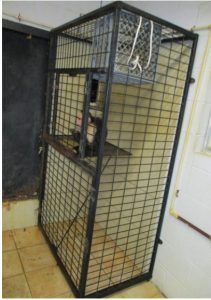
Conditions for Tim Lepard’s monkeys (Courtesy USDA)
Conditions can get rapidly worse after animals have left the spotlight.
Robert Mullen, a USDA-licensed exhibitor who carted animals across the United States to perform at state fairs, made headlines in 2016 when concerns about his “skeleton” tigers surfaced.
Mullen retired the big cats in the wake of these concerns, but the suffering didn’t end there. State records showed the retired tigers were routinely emaciated and parasite ridden, and that Mullen was feeding them roadkill, poor quality meat, and meat from horses that he reportedly helped slaughter himself. Eventually, he was forced to surrender his big cats through state action.
Other animals suffered at Mullen’s hands, too: More than 30 exotic animals burned to death on his property in a trailer fire from wiring that likely wasn’t up to code, according to sheriff reports and other public records documents. Yet to this day, Mullen is still in business, according to recent posts to his Facebook page.
Sign Lady Freethinker’s petition to help any sick and suffering animals at Robert Mullen’s Roadside Zoo in Florida.
SIGN: Justice for Emaciated, Parasite-Ridden Tigers at Florida Roadside Exhibit
3. Nonprofit Status, Conservation Claims, and “Sanctuary” Statements Don’t Guarantee Animal Welfare.
We found exploitative exhibitors often state they have years of professional experience and that they always put the animals’ welfare first — with some even claiming their exploitative venues contribute to conservation, help endangered species, “rescue” abused animals, or provide animals with “sanctuary.”
The reality is that true sanctuaries don’t allow for paid, physical contact with animals. Venues that make money from public interactions or that “work” the animals — regardless of nonprofit status, conservation claims, or sanctuary statements — are not putting the animals’ welfare first.
Ivie Acres Farm — a petting zoo in Granstville, Utah, that offers paid interactions with farm animals and animal rentals — says on its website that “we meet and exceed all the requirements of the Animal Welfare Act,” and owner Sherrie Ivie told Lady Freethinker she is working toward nonprofit status.
But public records documents show federal inspectors cited and fined the farm for numerous welfare violations, including capybaras with hair loss, underweight cows with “prominent ribs and pelvic bones”, rabbits in enclosures between 98 and 105 degrees, feces-saturated enclosures, and animals left without adequate food or water.
Feds also cited the farm for the following, according to inspection reports:
- A camel found on the ground foaming at the mouth
- A camel discovered dead with her head and neck wrapped around a fence pole
- A Southdown sheep stained with urine and feces
- A 5-year-old dwarf rabbit with hair loss, wounds, and a swollen and draining eye
- A 6-month-old zebra named Zoey who fell out of an improperly secured livestock trailer, was dragged down the interstate, and suffered such severe injuries that she was euthanized
Oswald’s Bear Ranch, in Newberry, Michigan, says on its website that the facility is “committed to the welfare of abused and neglected bears by rescuing them from various harmful circumstances,” but the facility allows exploitative and dangerous photos with bear cubs.
Oswald’s claims of “rescuing” bear cubs also have been contested — with PETA reporting the facility allegedly buys cubs from zoos and sends bears to slaughter for being “too mean.” Past news reports quote Dean Oswald saying that he slaps bear cubs, “the same as a young puppy dog,” to “teach” them discipline.
Bears have undeniably died due to captivity at Oswald’s. A sheriff’s deputy tragically shot one of Oswald’s bears to death after the bear escaped and wandered to a neighboring property, according to reports. Federal inspectors also have cited Oswald’s for lying to APHIS officials, housing bears in non-structurally safe enclosures, and feeding the bears inadequate diets — including restaurant scraps, donated meat, produce and dog food.
Single Vision is a registered nonprofit organization in Florida that advertises itself as a “wildlife sanctuary” that is “protecting our vanishing wild”, according to its Facebook page. But federal inspectors documented 31 violative, hands-on interactions with exotics that included petting, hugging and touching bears, cougars, lions, and a jaguar from June 2020 to January 2022.
State authorities also have cited Single Vision for inadequate caging requirements, possessing wildlife without documentation of their source, and keeping bear cubs on his porch.
As of July 25, 2022, Single Vision was under both state and federal investigation, according to a statement from the USDA to Lady Freethinker.
Read more about how animals are suffering at Single Vision below.
Florida Roadside Zoo ‘Single Vision’ Being Investigated For Wild Animal Interactions
4. Wild Animals’ True Needs Can’t Be Met in Cruel Captivity.
Elephants are highly intelligent, sensitive animals who live in close family groups and can roam for up to 30 miles a day in the wild at speeds of 25 mph. Wild tiger mothers are fiercely protective of their cubs, leaving them only to hunt. They watch their babies closely and train them to survive for their first two years of life.
While animal attractions might claim they have the habitats and knowledge to allow captive wild animals to thrive, public records revealed they often don’t even meet minimum welfare standards.
Animals escaping from their captors and roaming — as is their natural behavior to do — into surrounding communities was an issue for numerous exhibitors.
The Dawn Animal Agency, which rents out both domestic and exotic animals for films, theater, stunts, magazine covers, live performances, and commercials, made headlines in 2018 when an 8,000 pound, 46-year-old Asian elephant named Fritha escaped onto a nearby roadway, prompting a response from the state police.
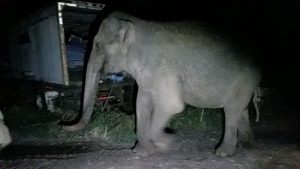
Fritha on the loose (Photo Credit: New York State Police)
The venue – which has an associated nonprofit that claims to be a “sanctuary” but rotates animals in and out to “work” in entertainment, according to news reports — has been cited for incomplete records, an outdated veterinary program, enclosures in need of repair, and sanitation issues.
On the state level, inspectors cited the business after a female reindeer disappeared from the property without documentation, for not testing a dead deer for chronic wasting disease, and on several counts of prohibited possession/sale of endangered species, illegally possessing dangerous animals, possessing domestic game birds without a license, and possessing a regulated species, according to public records documents.
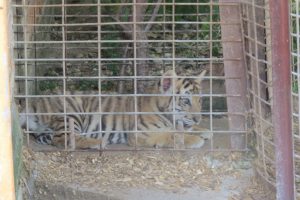
A tiger cub at Animal Haven Farm (Courtesy Waupaca County Sheriff’s Office)
Federal inspectors cited Animal Haven Farm – a for-profit business in Weyauwega, Wisconsin, owned by Dawn Hofferber – after discovering a tiger cub who reportedly was less than 4-weeks-old was taken to a classroom where students allegedly were “allowed to pet the animal” and take photos with him, according to the USDA documents. The inspector noted cubs’ immune systems aren’t adequately developed until 8 weeks old.
Other issues at the Farm over the years included a liger who went without water for more than 20 hours, missing sales records for tiger cubs, multiple animals with untreated medical conditions (including eye issues, hair loss, scours, and lumps), loose animals and sanitation issues, according to USDA reports.
Hofferber, in speaking to Lady Freethinker, said she disagreed with the federal inspectors’ findings and that she would “do this all over again.” Animal Haven Farm remained under federal investigation earlier this year, according to a USDA statement.
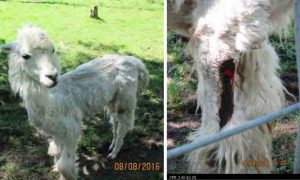
Conditions at Animal Haven Farm. (Courtesy USDA)
Read more about how animals are suffering at Animal Haven Farm below.
Wisconsin Roadside Zoo Fined $6,000+ for Violations, Under Federal Investigation
5. Animal Attractions Are Dangerous For People, Too.
Animal attractions are dangerous for humans — whether they choose to patronize the cruel venues or not.
Public records documents showed keepers mauled by animals, visitors getting bitten, scratched, and attacked at the marketed “family friendly” venues, animals brought into the state without required health certificates, and wild animals escaping their enclosures and running loose in the surrounding communities.
In addition to the escaped bear from Oswald’s tragically shot to death, USDA records show a bear cub bit a house guest while being held.
Single Vision’s owner required an emergency room visit and staples in his head after a 6-year-old cougar mauled him while the two “played around,” according to a statement from Bovard obtained through a public records request.

(Courtesy FWC)
Blue Springs Safari got cited by federal officials for transporting four primates into Mississippi without obtaining the required health certificates clearing them of disease.
Both Wilstem and Blue Springs Safari had kangaroos escape out into the surrounding communities. Like Dawn Animal Agency, Wilstem also had elephants loose on a public roadway— in their case, following a transport fire, according to news reports.
And state police had to respond when a Watusi — a cow that can weigh up to 1,600 pounds – rammed a vehicle with children inside at the self-guided “Drive-Thru Safari” at the Wild Animal Park in New York, according to public records documents.
News has reported Lepard’s hands are covered with scars from “past run-ins with uncooperative monkeys past and present” during his “monkey rodeo” — highlighting the dangers the Humane Society of the United States warns are ever present with primates. News also has reported that Lepard’s animals escaped during a show and that he’s been cited on both federal and state levels for allowing people to get too close to the monkeys and touch them.
If you haven’t already, sign our petition demanding the animals used for Lepard’s cruel monkey rodeo be transferred to reputable sanctuaries.
SIGN: Justice for Terrified Monkeys Forced to Ride Running Dogs in Cruel Rodeo
BOTTOM LINE: Don’t Patronize These Places!
Please remember that just because a facility is up and running, that doesn’t mean their record is clean — or that the animals are receiving even the bare minimum welfare requirements mandated by federal law.
Our investigation revealed that while inspectors may document violations, they rarely follow up with penalties or enforcement that could stop the cruelty — and when they do, it’s often with paltry fines and only after years, and sometimes decades, of serious animal suffering.
According to USDA documents:
- Oswald’s had five violations across five of his most recent 27 inspections — or about 19 percent.
- Wilstem had 9 violations cited across two of its nine most recent inspections — or 22 percent.
- Dawn Animal Agency had 20 violations across six of their last 16 inspections — or about 38 percent.
- Animal Haven Farm had 23 violations across nine of their last 20 inspections— or 45 percent.
- Mullen had 18 violations across 10 of his 16 most recent inspections — or about 63 percent.
- Ivie Acres Farm had 42 violations across 16 of her last 24 inspections — or 67 percent.
- Lepard had 17 violations across nine of his 13 most recent inspections — or 69 percent.
- Hampton had 141 violations across 33 of his most recent 47 inspections — or 70 percent.
- Johnson had 42 violations across 15 of his 21 most recent inspections — or 71 percent.
- Single Vision had 46 violations noted at 13 of its most recent 18 inspections — or 72 percent.
All of these venues still have active USDA licenses with the exception of Mullen, whose licensing status shifted to “Expired” in October 2022, according to USDA documents.
Please don’t contribute to animal suffering. Avoid any animal attraction or event that forces animals into unnatural and stressful situations. Speak out whenever cruel events come to your area. And please make sure to sign and share Lady Freethinker’s related petitions and full stories.
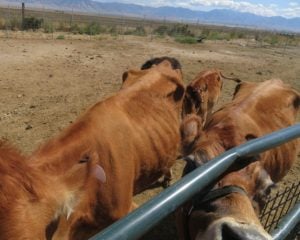
Footage from Ivie Acres Farm (Courtesy USDA)
Editorial Note: The number of violations and inspections per exhibitor in this report were accurate as of Oct. 10, 2022.

